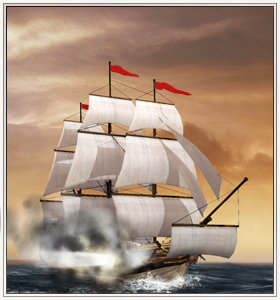Difference between revisions of "Carronade Frigate (ETW Unit)"
Tango12345 (talk | contribs) (updating to final standard) |
(→Tactics) |
||
| Line 6: | Line 6: | ||
Historically, only the Royal Navy experimented with an all-carronade armament aboard HMS Glatton (in service from 1795). Glatton carried 28 64-pounder and 28 32-pounder carronades, giving a weight of fire that was more than 17% greater than HMS Victory could deliver at the Battle of Trafalgar! This massive firepower allowed her, on one occasion, to chase all eight vessels in a French squadron back into port. Oddly enough, the next two vessels to carry the name “Glatton” in RN service were also massively over-armed. | Historically, only the Royal Navy experimented with an all-carronade armament aboard HMS Glatton (in service from 1795). Glatton carried 28 64-pounder and 28 32-pounder carronades, giving a weight of fire that was more than 17% greater than HMS Victory could deliver at the Battle of Trafalgar! This massive firepower allowed her, on one occasion, to chase all eight vessels in a French squadron back into port. Oddly enough, the next two vessels to carry the name “Glatton” in RN service were also massively over-armed. | ||
| − | == | + | ==Details== |
| − | Carronade Frigates fill an interesting niche in a navy. They lack the range of other ships of the line; however, they are more | + | Carronade Frigates fill an interesting niche in a navy. They lack the range of other ships of the line; however, they are more maneuverable than the larger ships and still able to carry devastating, if short ranged, firepower. Carronades are best used if they can sneak up to the stern or bow of the ship, so that they can deploy their heavy, close-range firepower without being punished too harshly for it. |
==Factions== | ==Factions== | ||
Revision as of 10:21, 10 October 2011
 Carronade frigates are single-deck vessels, with extremely impressive short-range firepower.
Carronade frigates are single-deck vessels, with extremely impressive short-range firepower.
Overview
Normally frigates would be armed with long guns, probably no larger than 12-pounders. A few short-barrelled 64-pounder carronades might be aboard to give a close-in broadside more weight of shot. A carronade frigate goes one better, and carries nothing but carronades – short guns that are half the weight of the equivalent conventional cannon. While the weight of a broadside is truly awesome, the frigate has to get in close in order to blow an enemy to smithereens thanks to the carronades’ limited range. A clever enemy will stay out of range of the carronades’ horrendous power and take long range pot shots.
Historically, only the Royal Navy experimented with an all-carronade armament aboard HMS Glatton (in service from 1795). Glatton carried 28 64-pounder and 28 32-pounder carronades, giving a weight of fire that was more than 17% greater than HMS Victory could deliver at the Battle of Trafalgar! This massive firepower allowed her, on one occasion, to chase all eight vessels in a French squadron back into port. Oddly enough, the next two vessels to carry the name “Glatton” in RN service were also massively over-armed.
Details
Carronade Frigates fill an interesting niche in a navy. They lack the range of other ships of the line; however, they are more maneuverable than the larger ships and still able to carry devastating, if short ranged, firepower. Carronades are best used if they can sneak up to the stern or bow of the ship, so that they can deploy their heavy, close-range firepower without being punished too harshly for it.
Factions
 Great Britain
Great Britain United Provinces
United Provinces Afghanistan
Afghanistan Austria
Austria Bavaria
Bavaria Dagestan
Dagestan Gran Colombia
Gran Colombia Courland
Courland Denmark
Denmark France
France Genoa
Genoa Georgia
Georgia Greece
Greece Hannover
Hannover Hessen
Hessen Hungary
Hungary Ireland
Ireland Louisiana
Louisiana Mamelukes
Mamelukes Maratha Confederacy
Maratha Confederacy Mexico
Mexico Mughal Empire
Mughal Empire Mysore
Mysore Naples & Sicily
Naples & Sicily New Spain
New Spain Norway
Norway Ottoman Empire
Ottoman Empire Italian States
Italian States Savoy
Savoy Poland-Lithuania
Poland-Lithuania Portugal
Portugal Prussia
Prussia Punjab
Punjab Quebec
Quebec Russia
Russia Persia
Persia Saxony
Saxony Scotland
Scotland Spain
Spain Sweden
Sweden Thirteen Colonies
Thirteen Colonies United States
United States Venice
Venice Westphalia
Westphalia Württemberg
Württemberg
